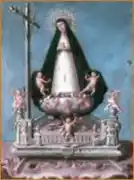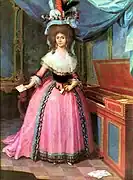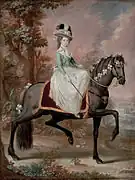José Campeche y Jordán | |
|---|---|
 Self portrait of José Campeche, 1800 | |
| Born | José Campeche Jordán December 3, 1751 |
| Died | November 7, 1809 (aged 57) San Juan, Puerto Rico |
| Nationality | Puerto Rican |
| Education | Trained by Luis Paret y Alcázar |
| Known for | Painting |
| Notable work |
|
| Movement | Rococo |
José Campeche y Jordán (December 23, 1751 – November 7, 1809), is the first known Puerto Rican visual artist and considered by art critics as one of the best rococo artists in the Americas. Campeche y Jordán loved to use colors that referenced the landscape of Puerto Rico, as well as the social and political crème de la crème of colonial Puerto Rico.[1][2]
Early life
Campeche was born in San Juan, colonial Puerto Rico. His parents were Tomás Campeche (1701–1780) and María Jordán y Marqués. His father was a freed slave born in Puerto Rico and his mother was a native of the Canary Islands so he was considered to be mulato.[3] His father was a gilder[4] who restored and painted religious statues, and had an influence on the young Campeche's interest in the arts. Campeche was trained by Luis Paret y Alcázar, a Spanish court painter banished from Spain.[2][5][6]
Paintings
Campeche distinguished himself with his paintings related to religious themes and of governors and other important figures. His most famous paintings and his best known portraits are of:[2][5][6]
- Juan Alejo de Arizmendi
- Our Lady of Bethlehem
- Portrait of Brigadier don Ramón de Castro y Gutiérrez
- Portrait of Governor don Miguel de Ustariz
- Saint John the Baptist
- The Bishop of San Francisco de la Cuerda
- The Rescue of Don Ramón Power y Giralt in honor of Ramón Power y Giralt
- The Sacred Family
- The Virgin of the Rosary
- The Vision of Saint Anthony
- Virgen de la Soledad de la Victoria
- Doña María de los Dolores Gutiérrez del Mazo y Pérez, ca. 1796.
 Virgen de la Soledad de la Victoria (c. 1782-1789), Museo de Arte de Puerto Rico.
Virgen de la Soledad de la Victoria (c. 1782-1789), Museo de Arte de Puerto Rico.![The Rescue of Don Ramón Power y Giralt [a Puerto Rican independentist forerunner] (c. 1790)](../I/Rescue_of_Ramon_Power.jpg.webp) The Rescue of Don Ramón Power y Giralt [a Puerto Rican independentist forerunner] (c. 1790)
The Rescue of Don Ramón Power y Giralt [a Puerto Rican independentist forerunner] (c. 1790)._Do%C3%B1a_Mar%C3%ADa_de_los_Dolores_Guti%C3%A9rrez_del_Mazo_y_P%C3%A9rez%252C_ca._1796..jpg.webp) "María de los Dolores Gutiérrez del Mazo y Pérez" (ca. 1796), Brooklyn Museum.[7]
"María de los Dolores Gutiérrez del Mazo y Pérez" (ca. 1796), Brooklyn Museum.[7]![[Spanish Governor of Puerto Rico] Ramón de Castro (1800)](../I/Ramon_de_Castro.jpg.webp) [Spanish Governor of Puerto Rico] Ramón de Castro (1800)
[Spanish Governor of Puerto Rico] Ramón de Castro (1800) The Daughters of Governor Ramón de Castro (1797)
The Daughters of Governor Ramón de Castro (1797)![[Cuban-born] Doña María Catalina de Urrutia (c. 1788), Museo de Arte de Ponce.](../I/Jos%C3%A9_Campeche_-_Do%C3%B1a_Mar%C3%ADa_Catalina_de_Urrutia.jpg.webp) [Cuban-born] Doña María Catalina de Urrutia (c. 1788), Museo de Arte de Ponce.
[Cuban-born] Doña María Catalina de Urrutia (c. 1788), Museo de Arte de Ponce. Don José Mas Ferrer (c. 1795), Smithsonian American Art Museum.
Don José Mas Ferrer (c. 1795), Smithsonian American Art Museum. Saint John Nepomuceno (c. 1798), Smithsonian American Art Museum.
Saint John Nepomuceno (c. 1798), Smithsonian American Art Museum. María Dolores Martínez (c. 1792), Museo de Arte de Ponce.
María Dolores Martínez (c. 1792), Museo de Arte de Ponce.![[Puerto Rican-born] Isabel O'Daly (c. 1808), Smithsonian American Art Museum.](../I/Jos%C3%A9_Campeche_y_Jord%C3%A1n_-_Isabel_O'Daly_-_1996.91.2_-_Smithsonian_American_Art_Museum.jpg.webp) [Puerto Rican-born] Isabel O'Daly (c. 1808), Smithsonian American Art Museum.
[Puerto Rican-born] Isabel O'Daly (c. 1808), Smithsonian American Art Museum..jpg.webp) The Vision of St. Francis (c. 1809), Museo de Arte de Ponce.
The Vision of St. Francis (c. 1809), Museo de Arte de Ponce. Dama on horseback (c. 1795), Museo de Arte de Ponce.
Dama on horseback (c. 1795), Museo de Arte de Ponce.![Bishop Juan Alejo de Arizmendi [an independentist forerunner], (c. 1808).](../I/Juan_Alejo_de_Arizmendi2.jpg.webp) Bishop Juan Alejo de Arizmendi [an independentist forerunner], (c. 1808).
Bishop Juan Alejo de Arizmendi [an independentist forerunner], (c. 1808).
Importance
Not only did the Puerto Rican society of the time appreciate Campeche's personal and artistic merits but he is now considered to be amongst the most gifted rococo artists in the Americas. His works of art can be found in museums, churches and chapels, such as Capilla del Cristo in San Juan, and in private collections in Puerto Rico and Venezuela. Campeche died in the city of San Juan on November 7, 1809.[5][6]
High-resolution images of works of art from Puerto Rico's museums are being digitized and made available online with the help of the institute, Google Arts & Culture, Lin Manuel Miranda and other stakeholders. 350 such works were available online by November 7, 2019, including many works by José Campeche.[8][9][10][11]
Commemorations
- There is a "José Campeche room" in the former Dominican Convent in Old San Juan, Puerto Rico, where some of his works can be seen.[12] The building is currently being renovated and will be reinaugurated as the National Gallery of Puerto Rico.
- Puerto Rico has various schools and avenues named after Campeche to honor his memory. The José Campeche High School is located in San Lorenzo.[13][14]
- Manuel Gregorio Tavárez composed a funeral march "Redención" in Campeche's honor.
- Puerto Rican graphic artist Lorenzo Homar also created a work of art commemorating Campeche.
- Campeche is buried in the San José Church in Old San Juan.[5][6]
See also
References
- ↑ Tatum, Charles M. (2014). Encyclopedia of Latino Culture: From Calaveras to Quinceañeras. Santa Barbara, CA: Greenwood. p. 120. ISBN 978-1-440-80099-3. OCLC 882253127.
882253127
- 1 2 3 "José Campeche | Museo de Arte de Puerto Rico". www.mapr.org.
- ↑ Puerto Rico. Office of Historian (1949). Tesauro de datos historicos: indice compendioso de la literatura histórica de Puerto Rico, incluyendo algunos datos inéditos, periodísticos y cartográficos (in Spanish). Impr. del Gobierno de Puerto Rico vol. 2. p. 10. Retrieved 2 May 2020.
- ↑ "Revista del Instituto de Cultura Puertorriqueña". Issuu. 13 October 2016.
- 1 2 3 4 "José Campeche y Jordán | Smithsonian American Art Museum". americanart.si.edu.
- 1 2 3 4 El Nuevo Dia Archived July 18, 2006, at the Wayback Machine
- ↑ José Campeche (1796). "Doña María de los Dolores Gutiérrez del Mazo y Pérez". Brooklyn Museum website. New York.
- ↑ Katz, Leslie (7 November 2019). "Lin-Manuel Miranda and Google introduce Puerto Rican art to everyone". CNET. Retrieved 8 November 2019.
- ↑ "Instituto de Cultura Puertorriqueña, San Juan, Puerto Rico". Google Arts & Culture. Retrieved 8 November 2019.
- ↑ "Una plataforma de Google digitalizará sobre 2,000 pinturas en Puerto Rico". El Nuevo Dia (in Spanish). 7 November 2019. Retrieved 8 November 2019.
- ↑ "The Pictorial Solemnity of Campeche - Instituto de Cultura Puertorriqueña". Google Arts & Culture. Retrieved 8 November 2019.
- ↑ "Old San Juan, Puerto Rico: History and Mysticism". May 30, 2016.
- ↑ "After Hurricane Maria, struggling schools are a haven for students". wbir.com.
- ↑ Nazario, Keysha (January 24, 2020). "26 Escuelas de Bayamón Podrán Abrir". Ciudad de Bayamón.
External links
- El Nuevo Dia
- José Campeche - Testigo de la Ciudad, Arturo Dávila, Cuadernos de Cultura #12, Instituto de Cultura Puertorriqueña, 2005
- Scholarly articles about José Campeche at the Spanish Old Masters Gallery